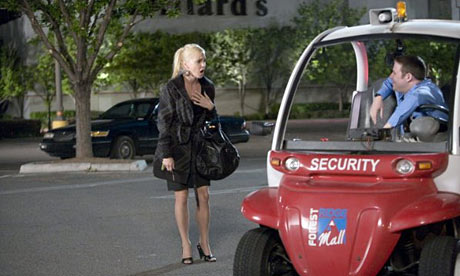
"I wanted to show them just having sex and her passed out, and I thought that would be funnier."
So says Jody Hill, writer/director of Observe and Report, due to be released in Britain next week, but, since its opening in the US last Friday, is already the cause of a mighty online stink. Threatening to derail the rise of star Seth Rogen, the aggressively off-kilter black comedy invites us into the life of Ronnie Barnhardt, a scowling bipolar security guard at a generic shopping mall (laughing yet?), fond of excessive force, prescription medication and unobtainable women (how about now?), whose interests come together when a slobbered-after blonde passes out on a date.
At which point Hill shows him having sex with her drooling, unconscious body. Yet a few moments after the film has revealed itself to be that rarest of cinematic beasts, the studio-backed rape comedy, she half-rouses - uttering just enough foul-mouthed encouragement to convey that a) she's awake and b) kind of likes it like that.
If you're laughing now, or feeling that in some way the envelope of staid convention has been subversively pushed, then you're clearly on one side of the debate that's blown up this week, one that's ranged from Hill's film in particular to the age-old question of where any of our lines should be drawn in goading and insulting one's audience. Amid the furore, those chipping in have included Vanity Fair's James Wolcott, Spout Blog, The Hollywood Reporter's Risky Business and a parade of others besides - a whole smörgåsbord of opinion the result.
So much so that Some Came Running's excellent Glenn Kenny posted a counter-argument that the whole furore was simply the product of an overaccelerated internet culture desperately trying to keep itself occupied by "gnawing on some chum". Not such a stretch - unless you feel, as I do, that there's actually only so much insight to be had from Kenny, or the similarly inclined Vadim Rizov, or even the holy Wolcott on the issue - because, as with any discussion of rape, the people whose reaction really matters are women.
And there have been plenty of deeply furious female voices to be heard. For all the impeccable professionalism they brought to their reviews, both the New York Times's Manohla Dargis and Salon's Stephanie Zacharek (coincidentally perhaps the two best film critics writing in English today) appeared at the very least discomfited by what they had seen. Lots more, meanwhile, have been scalding in their criticism of a scene that's brought them genuine distress (see, among others, Lindsay Bayerstein, Tiger Beatdown and Jezebel).
And it's that gut-authentic response that I'm not sure any male commentator can compete with, whether dealing with Hill's callow provocation specifically or any film swimming in the same dank waters. On a cerebral level, it's interesting to note the way the scene exemplifies the kind of essential glibness that always sinks that most dicey of genres, the deadpan black comedy - and also that (as Kenny points out) the project comes with a setup that's also offensive to the working class. As always, the joke falls flat because what's being presented to us as daring, oh-yeah-I-said-it, nihilism is actually just another well-paid white hack slagging off those less powerful than himself, Jeremy Clarkson transposed to the big screen.
But even these discussions lead back to the people being most affronted here, and to the importance of female opinion here above, say, mine. If one of the benefits of getting older is (or should be) learning not to cheapen the currency of your outrage by spilling it over everything in sight, it takes a film that attacks us at our very cores to provoke such palpable disgust.
It's the reason why, when any number of morally sloppy films have vexed me down the years (and I'm sure you have your own favourites), it's only the seemingly unremarkable Stephen King adaptation The Mist that has, in recent memory, inspired me to rise from my seat, swear at the screen as I walk out, and to still feel that anger thinking about it even now. Here, appalled by an ending I'll restrain myself from revealing, my own insight was that of being a father - and the rage the film stirred in me such that I happily wish its director Frank Darabont all manner of sorry misfortune in return. The thing is, I don't expect anyone without kids to share that degree of visceral loathing - more to the point, however, I also wouldn't expect them to question my right to feel it.

